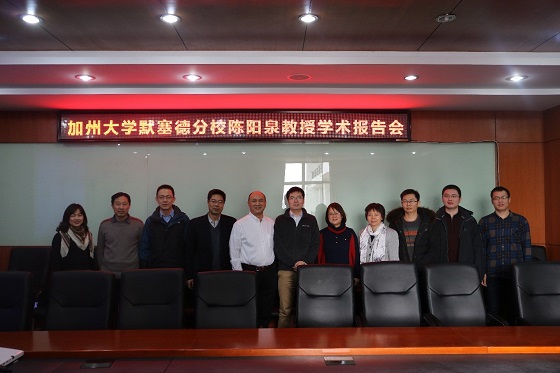From MAS-net (mobile actuator and sensor networks) to CPS (cyber-physical systems) and from HC-CPS (human-centric CPS) to CHS (cyber-human systems)

Robot will continue to be a hot topic in many years to come in this “big data, cloud computing, machine learning, virtual reality age”. But finding publishable research problems to attach in robotic control area is getting harder and harder. This talk will offer a new angle for emerging multi-robot control research opportunities. First, we treat robots as a network of moving sensors or moving actuators (MAS-net) that can be communicating with each other, forming a bigger closed loop control system, known as CPS (cyber-physical systems). Then I will further discuss the next step towards CHS: cyber-human systems, that extends our horizon of research attacks. I will share my belief that “Cyber-Human Systems” (CHS) will be a hot topic in the next 10-20 years as human (individual, team, society/community), computer (fixed, mobile and surrounds), and environment (physical, mixed and virtual) fuse.
Date and Time
Location
Hosts
Registration
- Date: 15 Jan 2018
- Time: 02:00 AM UTC to 03:00 AM UTC
-
 Add Event to Calendar
Add Event to Calendar
- University of Science and Technology Beijing, 30 Xueyuan Road, Haidian District, Beijing 100083, China.
- Beijing, Beijing
- China
- Building: Electromechanical Information Building
- Room Number: 1104B
- Contact Event Host
- Co-sponsored by Wei He
Speakers
YangQuan Chen of University of California
From MAS-net to CPS and from HC-CPS to CHS
Robot will continue to be a hot topic in many years to come in this “big data, cloud computing, machine learning, virtual reality age”. But finding publishable research problems to attach in robotic control area is getting harder and harder. This talk will offer a new angle for emerging multi-robot control research opportunities. First, we treat robots as a network of moving sensors or moving actuators (MAS-net) that can be communicating with each other, forming a bigger closed loop control system, known as CPS (cyber-physical systems). Then I will further discuss the next step towards CHS: cyber-human systems, that extends our horizon of research attacks. I will share my belief that “Cyber-Human Systems” (CHS) will be a hot topic in the next 10-20 years as human (individual, team, society/community), computer (fixed, mobile and surrounds), and environment (physical, mixed and virtual) fuse.
Biography:
YangQuan Chen earned BS from University of Science and Technology Beijing, MS from Beijing Institute of technology and Ph.D. from Nanyang Technological University, Singapore. He had been a faculty of Electrical Engineering at Utah State University from 2000-12. He joined the School of Engineering, University of California, Merced in summer 2012 teaching “Mechatronics”, “Engineering Service Learning” and “Unmanned Aerial Systems” for undergraduates; “Fractional Order Mechanics” and “Nonlinear Controls” for graduates. His research interests include mechatronics for sustainability, cognitive process control, small multi-UAV based cooperative multi-spectral “personal remote sensing”, applied fractional calculus in controls, modeling and complex signal processing; distributed measurement and control of distributed parameter systems with mobile actuator and sensor networks.
He serves as a Co-Chair for IEEE RAS Technical Committee (TC) on Unmanned Aerial Vehicle and Aerial Robotics (2012-18); served the TC Chair for the ASME DED Mechatronics Embedded Systems Applications (2009-10); Associated Editor (AE) for IEEE Trans. on Control Systems Technology (2000-2016), ISA Trans. (2012-2017), IFAC Control Engineering Practice (2012-2017) and Journal of Dynamics Systems, Measurements and Control (2009-15). He serves as Topic Editor-in-Chief of International Journal of Advanced Robotic Systems (Field Robotics), Section AE (Remote Sensors) for Sensors, AE for Mechatronics, Senior Editor for International Journal of Intelligent Robotic Systems, Topical AE for Nonlinear Dynamics and AE for Intelligent Service Robotics; IET Control Theory and Applications, and Fractional Calculus and Applied Analysis. He is a member of IEEE, ASME, AIAA, ASPRS, AUVSI and AMA.
